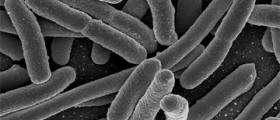
Escherichia coli is a certain type of bacteria which can be found in the intestines of animals and people. Most strains of the bacteria are largely harmless or may sometimes cause brief bouts of diarrhea. On the other hand, there are also very dangerous strains of Escherichia coli such as the O157:H7 which may be associated with vomiting, bloody diarrhea and severe cases of abdominal cramps. There are numerous ways of being exposed to E. coli. Recovery from such infections usually takes a week in adults, but when they occur in children they may lead to a life threatening medical condition which affects the kidneys and is medicinally referred to as hemolytic uremic syndrome.
Escherichia coli causes
The nasty type of E. coli strain described above actually produces a very toxic substance which causes significant damage to the lining of the small intestine and in most cases it leads to the onset of a bloody diarrhea. Among the most common causes of such infections is exposure to contaminated water, contaminated food and person to person contact. Animal and human feces may easily pollute surface and ground water such as lakes, rivers, streams and water commonly used for the irrigation of the crops. The public water systems commonly utilize ozone, ultraviolet light and chlorine in order to kill all the harmful bacteria, but in spite of that there have been certain outbreaks which were associated with contaminated municipal water supplies. Private wells may also be associated with similar problems. Sometimes a person may also get infected after swimming in lakes or pools which have been contaminated with animal or human feces. E.coli infections are commonly acquired by consuming foods which were contaminated with the bacteria. Those foods usually include restaurant meals, fresh produce, unpasteurized milk or ground beef. Restaurant meals can easily be contaminated by the bacteria because of servers or cooks who do not wash their hand after using the bathroom. Fresh produce such as lettuce or spinach are very vulnerable to contamination of fields by the runoff from cattle farms. This harmful bacterium can easily travel from person to person, especially in the cases when persons do not wash their hands properly. Children are usually at the biggest risk of acquiring an E. coli infection. There are various risk factors which may cause some people to be more likely to develop problems than some others, even though the infection may occur in anyone who gets exposed to the bacteria. Eating certain types of food items such as soft cheeses made from raw milk, cider, apple juice, unpasteurized milk and undercooked hamburgers greatly increases the risk of acquiring E. coli infections. Those who have a weakened immune system are at an increased risk of acquiring an E. coli infection as well. These people are usually those who have AIDS or are under the effects of drugs commonly used for the treatment of cancers or the prevention of the rejection of organ transplants. Age is another important risk fact. Older adults and young children are at an increased risk of becoming ill with E. coli infections and also acquiring some serious complications commonly associated with this type of infection.
How to treat Escherichia coli
It is a peculiar fact that in most cases of infections triggered by the E. coli bacteria, people usually do not seek any medical attention. If the symptoms of the infection are particularly severe it is of utmost importance to seek immediate medical attention. The doctor usually wants to know how often the patient vomits and how often he or she is having diarrhea. It is very important to tell the doctor if the vomit or the diarrhea contain blood, mucus or bile. If the patient has high fever, it is very important to notify the doctor. The doctor also usually wants to know the exact beginning of the symptoms and if the patient traveled outside the country in recent times. If someone in the household suffers from the same symptoms, the doctor needs to know about that. Abdominal cramps are also one of the alarming symptoms which need to be reported to the doctor. The most commonly experienced symptoms of the E. coli infection include vomiting, nausea, diarrhea which may sometimes be bloody, stomach tenderness and severe abdominal cramps. In some cases, the infection is not associated with any symptoms at all. On the other hand there are numerous other medical conditions which have symptoms very similar to those commonly associated with E. coli infections. This is why it may be very complicated to diagnose an E. coli infection. In most cases, the infection ends up after a week. The diarrhea usually triggers dehydration and other minor complications which need to be taken care of by carefully regulating the intake of fluids and essential minerals. Some severe cases may call for blood transfusion or dialysis.

















Your thoughts on this
Loading...